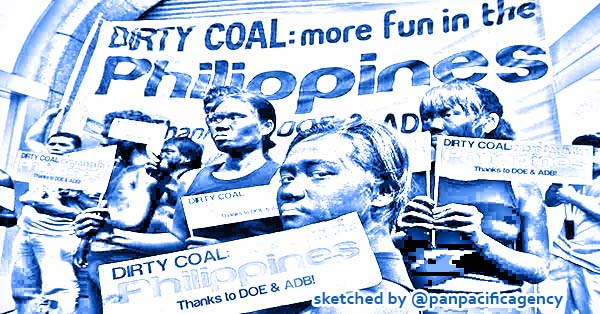[Analytics] Why is the Philippines so focused on coal?

This file photo shows environmental activists from Greenpeace dressed as "coal demons" protesting in front of the Asian Development Bank (ADB) calling on the ADB to stop funding projects using coal in the Philippines, Indonesia, Thailand and Vietnam. (AFP Photo). Sketched by the Pan Pacific Agency.
Although fossil fuels are the single biggest source of greenhouse gas (GHG) emissions, coal continues to be supported by both the government and businesses in the Philippines. Jason Thomas specially for The ASEAN Post.
While it is the cheapest fuel option, coal is also the most polluting one. With cleaner alternatives such as hydropower, solar, and wind energy readily available and decreasing in price, coal is no longer the safe, long-term investment it once was.
But burdened by the high cost of electricity, regular power interruptions and an unreliable transmission system, coal remains a viable energy option for the Philippines – especially with the subsidies, financial incentives and other forms of support that the industry enjoys
Coal is the country’s dominant energy source with a 52 percent share in gross power generation as of December 2018, followed by renewable energy sources (geothermal, hydro, solar, and wind) with 22 percent and natural gas at 21 percent.
Plans by the Philippines’ Department of Energy to ramp up coal production from 23 million metric tons (MMMT) from 2017-2018 to a staggering 282 MMMT from 2023-2040 as stated in its Coal Roadmap 2017-2040 flies in the face of the country’s ratification of the Paris Agreement, in which it committed to a 70 percent reduction in emissions by 2030.
While President Rodrigo Duterte used his State of the Nation Address in July to call for the fast-track of renewable energy development and a reduction in the dependence on traditional energy sources “such as coal”, he inaugurated a new coal-fired power plant last month – and there are plans for more such new developments.
More coal-fired power plants
The Philippines imports 75 percent of its coal supply – most of it from Indonesia and Australia – exposing the country’s electricity system to political unrest, price volatility and the risk of unfavourable foreign exchange rates.
This has made local coal-fired power plants an attractive proposition for power companies, and a recent report by environmental group Greenpeace detailed how five of the country’s biggest energy companies plan to increase their coal portfolios in the next two to six years from the current 14,579 megawatts (MW) to a proposed 21,836 MW.
Because they account for more than half of the current and proposed power projects in the country, Greenpeace argues that these companies’ actions will be crucial in determining whether the Philippines can comply with the low-carbon development path needed to address the global climate crisis.
“While the rest of the world is moving away from fossil fuels and shifting to clean renewable energy, the Philippines is moving in the opposite direction, largely because of pro-coal government policies that allow energy companies to keep building coal facilities despite their documented negative impacts on the climate, the environment and communities,” said Khevin Yu, a campaigner at Greenpeace Philippines.
A previous report by Greenpeace estimated that coal plant emissions could kill up to 2,400 Filipinos per year due to stroke, heart disease and other cardiovascular and respiratory diseases, and the Filipino public is fighting back against the construction of new coal-fired power plants.
Unhappy public
In September, the Power for People Coalition (P4P) led environmentalists, residents of coal-affected communities, church groups, and other stakeholders in holding massive protests in the Philippines – with thousands descending on Mendiola Street in front of the Malacanang presidential palace to demand a moratorium on new coal plants.
In June, research institute Center for Energy, Ecology and Development (CEED) called on Filipino legislators to reduce the country’s coal consumption due to its harmful effects on the environment.
Back in March, groups representing the country’s Catholic church and other NGOs urged financial institutions to divest their investments in coal-fired plants and focus on renewable energy instead.
Crucially, organisations such as the P4P and CEED have asked Duterte to issue an executive order for a moratorium on new coal-fired power plants, an audit on existing ones and a clear policy to accelerate the country’s transition to renewable energy.
“We pay for coal with our money, our health, our environment, and our future. In return, we get unreliable energy and fat profits for owners of power companies,” said P4P Convenor Gerry Arances, who is also CEED’s Executive Director.
“We want things to change, and we want it to change now.”